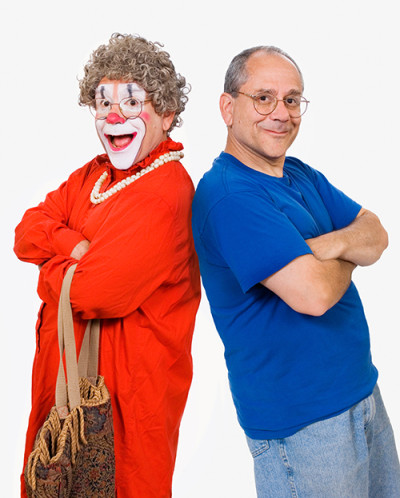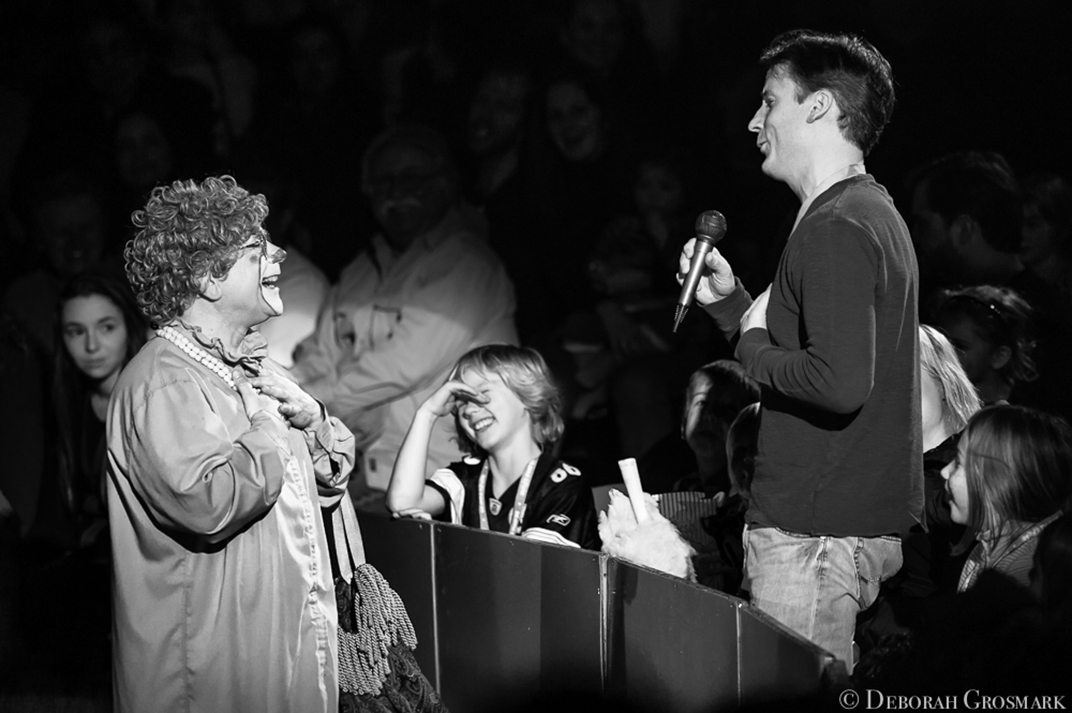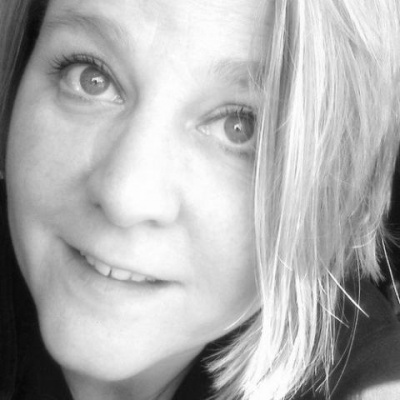Silent Clown Unplugged: A Sneak Peek at Barry Lubin’s Memoirs
The man behind the beloved Grandma character releases an autobiography today about his influences, his struggles with cancer and addiction, and his life and work as the world’s favorite Jewish cross-dresser.
Barry Lubin, better known to the world for the past 40 years as Grandma the clown, is releasing his book Tall Tales of a Short Clowntoday, and he is in rare company. It isn’t every year that a clown’s autobiography is released, let alone one by a cross-dresser. Lubin’s book doesn’t hold back either. He discusses his celebrated work with Ringling Brothers and Big Apple Circus, his current work and life abroad, his mentors, the toll long absences took on his relationships with family, his struggle with drugs and alcohol, his battle with cancer, and his deep affection for his audiences. He tempts us into the ring to imagine an itinerant life filled with great circus, honing the clown craft, good friends, and brushes with fame. Yes, Lubin likes to drop names, but when he does, there is usually a funny story involved, and he doesn’t come out looking like the hero, so you can forgive him and feel his pain. He admits, “I have a history throughout my life of putting my foot in my mouth and saying the wrong thing. It just happens the alternative is to say nothing and risk nothing. That’s too boring, and I can’t possibly do that.”
When Lubin was a young man growing up in Atlantic City, New Jersey, his father gave him a job for the summer rewinding reels of silent film classics starring Buster Keaton, Charlie Chaplin, Harold Lloyd, and the like. Through his dad’s work, he got to study many great film comedians and unknowingly store away the knowledge for his future career as a silent clown. Like most kids at some point, Lubin dreamed of being in show business, and he was drawn to comedy, having benefited from such an early education in it. By high school age, he had come up with a more sensible plan to attend college and go into the back end of show biz via television production, but in his third year at Emerson College in Boston, he ran away to audition for Ringling Brothers Clown College. He was accepted. After eight weeks, he graduated with honors and never looked back.

Barry is Grandma. Grandma is Barry.
What makes a good clown? Lubin stumbled upon the recipe at Clown College, and he has been doctoring that recipe ever since, never ditching the key ingredients that he discovered at the outset. The main ingredient was channeling his own essence. Another key ingredient over the years has been a metric ton of water. If you’ve ever seen Grandma perform, you know she likes to sprinkle a little water around. Over the course of 40 years, he has tweaked every show to fit his audience’s mood, and this is a skill he cannot easily put into words to share his recipe.
For starters, Lubin has come to realize that there is hardly any difference between himself and his character, apart from a dress and some make-up. He jokes about that, for example when he asked Geraldine Ferraro whether she was sure she wanted a Jewish transvestite on her Christmas card, but over time, he has become comfortable in the gear, more able to access the best of himself and connect with something he refers to in his book as “the zone.”
“At the very beginning of my career,” says Lubin, “I believed I was supposed to climb into this character. I would center myself, try to get away from everybody, and do some breathing exercises. Once I was transformed, I would walk out in front of the audience. The difference today is that there is nothing going on between how I am backstage and how I am in front of the audience. I just get into a slightly different state of what I would call relaxed concentration.”
Nice little Grandma or rebel?
In his book, Lubin sometimes hints at feeling like an underdog in everyday life. His affection for the everyman is certainly apparent in the circus ring, where he acts like an audience member who just stumbled into something wonderful. While other circus performers regale audiences with inspirational examples of what humans can accomplish with great discipline, Grandma reminds audiences that we are all human, our bodies can be not-so-flexible, we all make mistakes, and we need to laugh at ourselves sometimes. Though he makes it look effortless, just as acrobats do, it is only by reading his autobiography that we learn how a clown’s discipline is to adapt his work to the audience to make a connection. Grandma, like all the clowns before and after her, humanizes the experience of circus.
Lubin explains, “To this day, 40 years into the business, I still feel like I am not from the world of circus. I’m not a circus person. You can say I’m an insider in that world, but I’m still in awe of the people around me, many of whom have become dear friends. It isn’t hard to play it very real. Through my career, I have rarely come through the curtain. I normally enter through the audience.”
In fact, Grandma and Lubin himself, both like to buck authority upon occasion, especially when that authority happens to be the ringmaster: “I need an authoritarian figure who is trying to maintain control. I use some really deep-seated feelings I have about hating authority, and then I can disrupt the proceedings. It’s a wonderful situation for a clown to be in. I think the audience climbs into my soul when I go up against authority and I break social rules. It’s something we all want to do, but we’re really not allowed to.”
This outsider identity is often celebrated in various anecdotes throughout the book, like when he recalls his first day on the job at the Big Apple Circus. He was strolling around the reception tent to work the crowd and was escorted off the premises by a NYC cop, even though he was in full clown gear, because he didn’t have a ticket to the show. Many years later, during his acceptance speech at the Sarasota Ring of Fame in 2012, he looked around the crowd and asked “Isn’t anyone gonna throw me out?”

Learning from the greats, teaching the future greats
Lubin considers the great clowns Lou Jacobs, David Larible, Bill Irwin, and David Shiner his mentors. He says close observation is the key to learning from a more seasoned clown: “I consider a mentor someone who isn’t necessarily giving verbal advice but rather somebody who I am able to watch on a day-to-day basis. So much more is revealed than the advice that they give, like how they fashion a performance based on the audience response, which varies every day.”
On the other hand, at this point in his career, Lubin loves the idea of giving back and mentoring in the clowning community, and he openly invites young clowns to seek out his council: “When I started I was so hungry for that, and I knew nothing. So I sought out people who I really liked and respected. I just don’t understand why they don’t ask. Maybe I put up some kind of aura that is intimidating or not inviting to them. But every chance I get when I am asked, I am so happy to pass along the information that I have.”
Fortunately, he has had many opportunities to work with young clowns. He has taught workshops at Circus Juventas youth circus in Minneapolis and worked with Circus Smirkus on the artistic excellence committee. He has had a few noteable proteges, including Michelle Musser, currently at Cirkus Finlandia, and Mark Gindick, a New York clown who has a show called Wing-Man and who often fills in as Grandma. Lubin even got to see the world on someone else’s dime (a phrase he uses in his book to describe one of his motivations for clowning) by teaching for a semester at sea a few times. He describes the experience as life altering, explaining how he got to hang out with a NASA astronaut, sail up the Amazon, perform for orphans in Ghana, and tango in Argentina, to name a few highlights.

Life overseas
Lubin lives in Sweden now with his girlfriend and works often in the European market. He describes the gap between what he expected from Europeans and how he was received: “Regard for American clowning was low 20 or 30 years ago. Now there are American clowns who work exclusively in Europe, and they’re not viewed as American clowns, they’re viewed as successful clowns.” He does admit that Europe has a higher regard for the artist in general, and when asked about his current run in Budapest, he is quite enthusiastic about the free-standing circus buildings and how passionate the public is about their circus arts.
Yet, in his book, Lubin describes the world of circus as a contracting one. When pressed, he explains that the part that is contracting is the traditional circus, while the contemporary circus appears to be expanding. He is aware of tensions existing as a result of this and takes a fair though brave position:“This is a good controversy in my opinion, but I notice there are a few contemporary circus organizations that put down traditional circus and distance themselves from traditional circus. The only thing wrong with that is that they are not recognizing that their roots lie absolutely in traditional circus. Why not be polite about it and respect the art? Putting down traditional circus makes people become defensive about what they do and the inclination then is to put down contemporary circus. If I go to a show, contemporary or traditional, I want to be entertained, and I will respect you for doing it.”
Barry’s struggles
Reading the biography of a clown, you may not expect to travel through the harrowing details of drug and alcohol addiction or to face mortality via a cancer diagnosis, but those truths are what you get with Lubin’s book. These episodes bring an authenticity to his writing, showing that the man has struggled and suffered.
When Lubin makes a poor decision in life, he admits it. He also admits when he saw a golden opportunity and took it, even one that brought him some strife, as when he accepted the offer to license the Grandma character. It gave him more time with his young daughters and more security for his family, but he received criticism from the industry and some disappointed fans. He says he just couldn’t see the downside to spreading more Grandma around, and he is proud to hand pick and train the few people he trusts with the character he has created.
Lubin is just as happy to segue into the slightly more comfortable territory of describing failed gags. He takes a chapter to discuss failure and how to use it as a great motivator, adapting to audiences. That kind of introspection and honesty makes it all the more triumphant when he comes back to the circus after recovering from cancer or when he relocates his funniness after a dry spell nine months into sobriety. It makes it that much more hilarious when he sticks his foot in his mouth once again while trying to joke around with another celebrity and is mortified to receive the thousand-yard stare in response. You can’t help but feel for him, so that when he climbs up on podiums to be lauded with awards, you, the everyman and everygrandma, can almost imagine it were you.

Finding Barry
Lubin is one busy, jet-setting clown. He spends several months of each year performing in the USA and at various locations in Europe. In addition to his autobiography, he will soon launch a kickstarter campaign to fund a short film, which he hopes to adapt into a Broadway play. The story that inspired the play is alluded to in his book. The trailer for the film, shot at the Big Apple Circus and soon to be released, features Lubin as a classic tramp clown.
Tall Tales of a Short Clown
186 pages in English with photographs
Published by AuthorMike Ink
Available in print and e-versions
ISBN-10: 0991033027
ISBN-13: 978-0991033027
Authormike.com
Purchase through BarryLubin.com or Amazon.com
Featured Image: Deborah Grosmark Deborah Grosmark is an award-winning production photographer focusing on circus, the performing arts, and the cinematic stage. She remains an active member of the Circus Fans Association, Circus Now, and Circus4Youth and is an independent photographer for White Tops magazine (a circus arts trade publication since 1927). Grosmark’s images have been represented in fine art galleries, advertising campaigns, billboards, publications, feature films, and private and corporate collections.
...Do you have a story to share? Submit your news story, article or press release.





